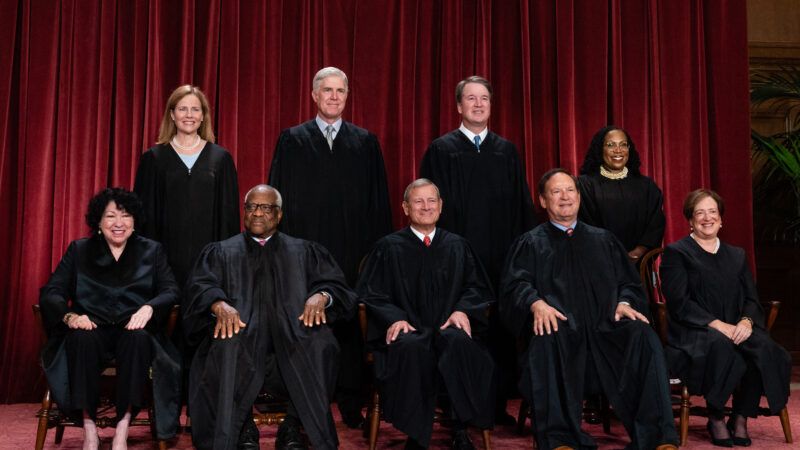The Supreme Court Tackles the First Amendment Right To Encourage Illegal Immigration
Understanding what’s at stake in United States v. Hansen

Federal law prohibits the act of encouraging or inducing unlawful immigration for private financial gain. Later this month, the U.S. Supreme Court will hear oral arguments in a case, United States v. Hansen, which asks whether that law should be struck down as an unconstitutional infringement on freedom of speech.
The law deserves to die on First Amendment grounds. As the Rutherford Institute and the Foundation for Individual Rights and Expression observe in an amicus brief they filed in the case, "expressing disagreement with laws through advocacy of their violation…is part of a deeply rooted American tradition." That tradition includes both the abolitionists who urged defiance of proslavery statutes in the 19th century and the civil rights activists who championed nonviolent resistance to Jim Crow in the 20th century. "Criminalizing mere encouragement of unlawful conduct," the brief points out, "would chill speech essential to movements advocating political and social change."
Here is a modern hypothetical that further illustrates the point. Assume that a self-described advocate of an open-borders immigration policy writes a book urging civil disobedience in the face of what the author argues is an unjust immigration regime. The book directly calls for undocumented immigrants to remain in the United States illegally and to fight for their rights.
The sale of such a book would seem to violate the plain text of the federal prohibition on encouraging illegal immigration for financial gain. Yet the First Amendment just as clearly protects the author's right to write and sell such a book. In that sort of contest between a federal law and a constitutional liberty, the Constitution always deserves to win.
If this case sounds familiar, it's because the Supreme Court heard a nearly identical dispute just three years ago. But that case, United States v. Sineneng-Smith, was ultimately resolved on narrow procedural grounds. The Court never ruled on the underlying First Amendment question. However, as I noted at the time, the Sineneng-Smith oral arguments suggested that "several justices seemed potentially open" to striking down the federal law at issue:
"What about a charity?" Justice Brett Kavanaugh asked Deputy Solicitor General Eric Feigin. "A charity provides food to someone who's in the country unlawfully…it's designed to provide food for people who can't get it elsewhere and they know that the people taking advantage of that are here unlawfully?"
Feigin conceded that such a charity might find itself on the receiving end of unwanted federal attention. "To the extent that a charity were doing something that violated the plain terms of the statute," Feigin answered, "that amounted to giving—effectively giving money to people to—or something that is the equivalent of money to people with the purpose that those people reside in the United States unlawfully, that might violate the statute."
Justice Sonia Sotomayor made a point similar to Kavanaugh's. "I read 'encourage or induce an alien to come, enter, or reside in the U.S., knowing or in reckless disregard of the fact that such coming to, entry, or residence is or will be in violation of law,'" Sotomayor told the deputy solicitor general, and it "seems to me" that all sorts of constitutionally protected speech and activity would be in trouble. "The hospital that's treating…an illegally present child with a disease, the church who provides worship to illegal aliens," both of these real-world examples, Sotomayor pointed out, "would be a violation of the statute."
The Supreme Court has repeatedly held that "overbroad laws that chill speech within the First Amendment's vast and privileged sphere" deserve no sanction. The federal ban on encouraging or inducing unlawful immigration should be overruled according to that exacting standard.


Show Comments (76)